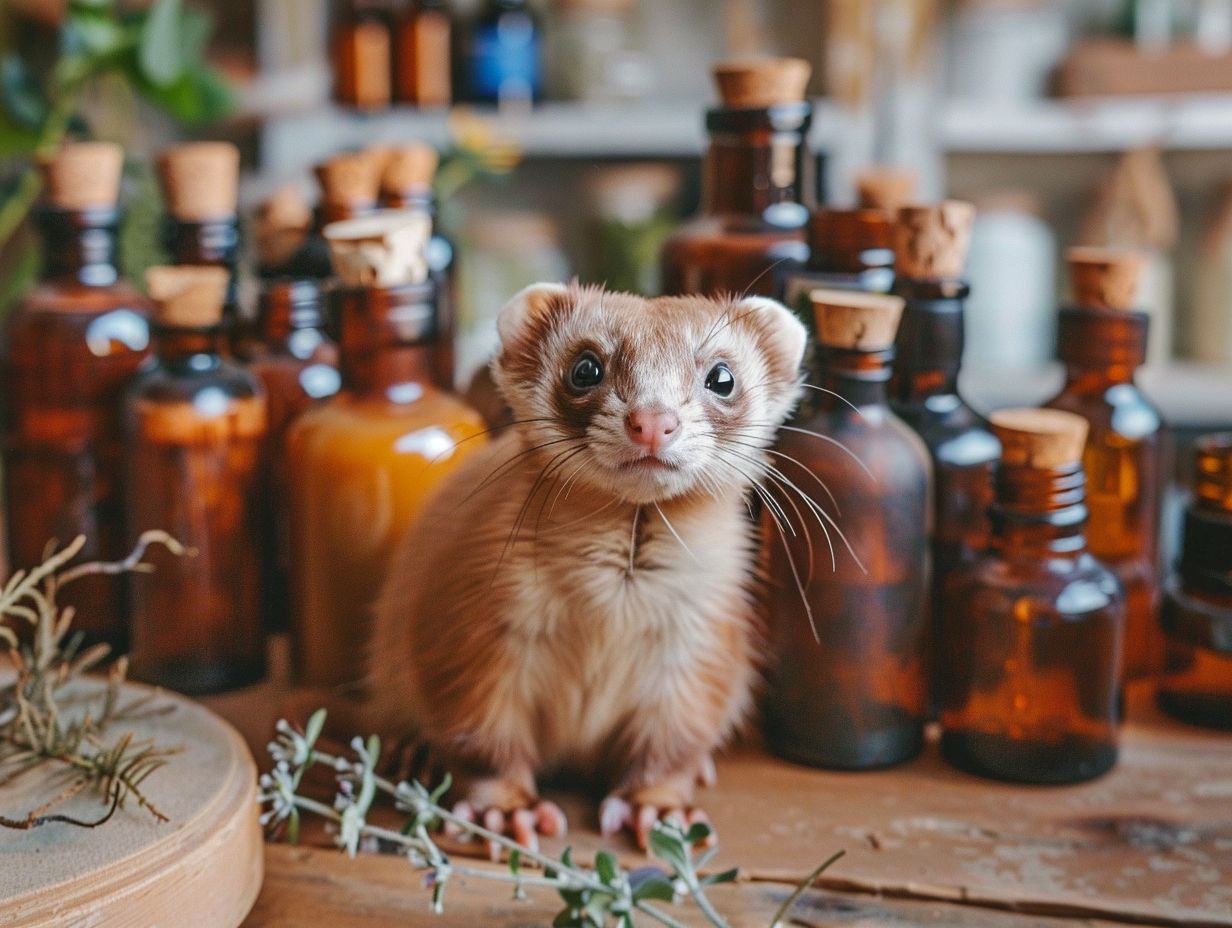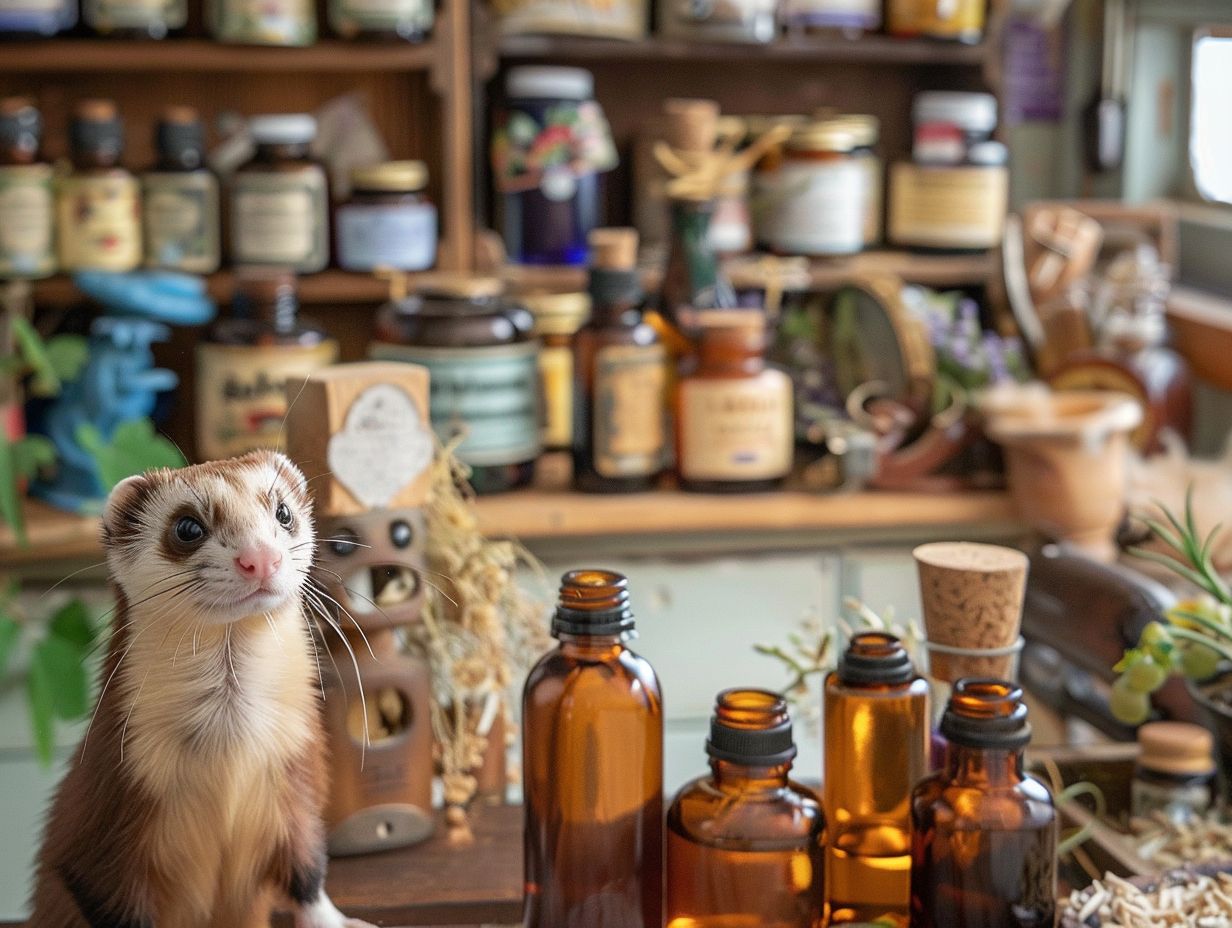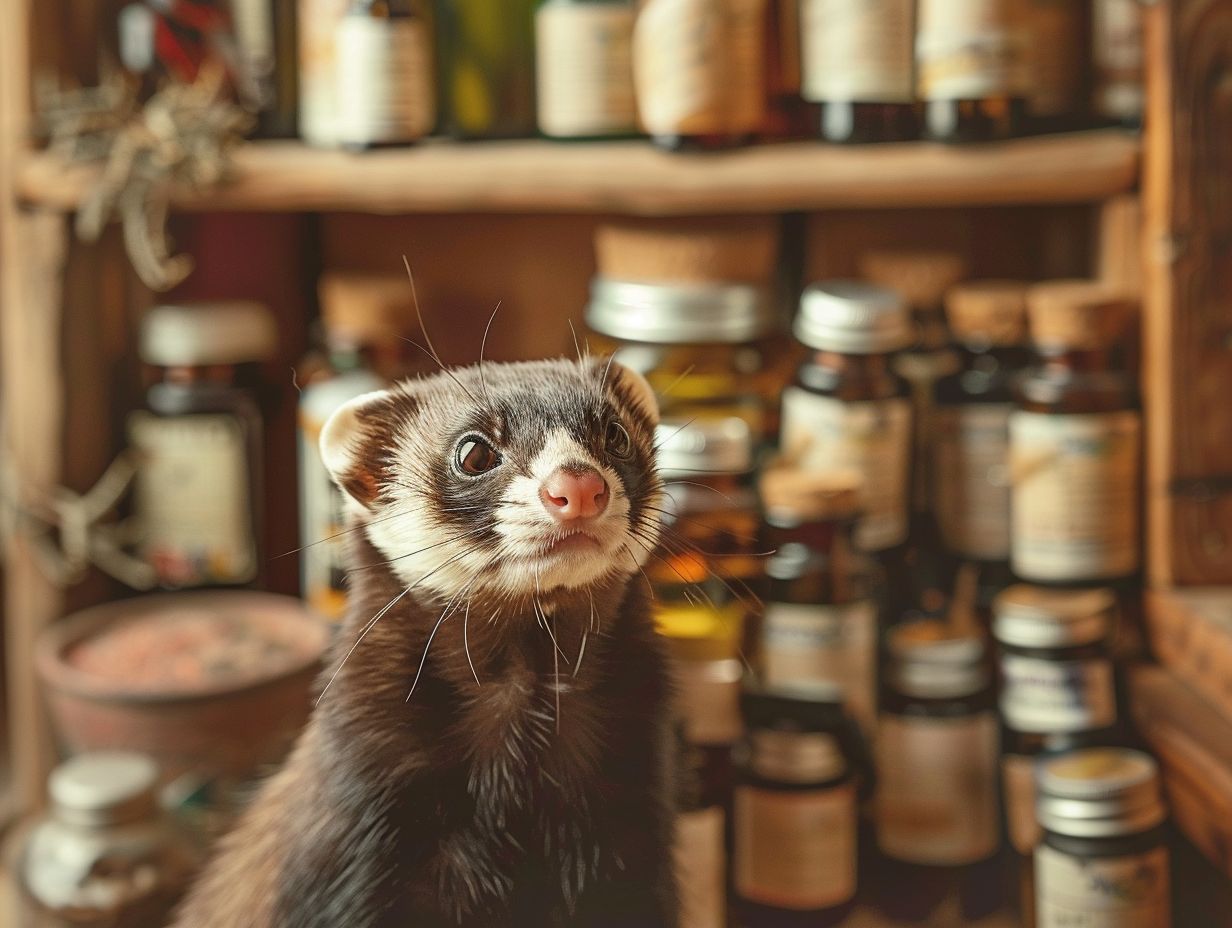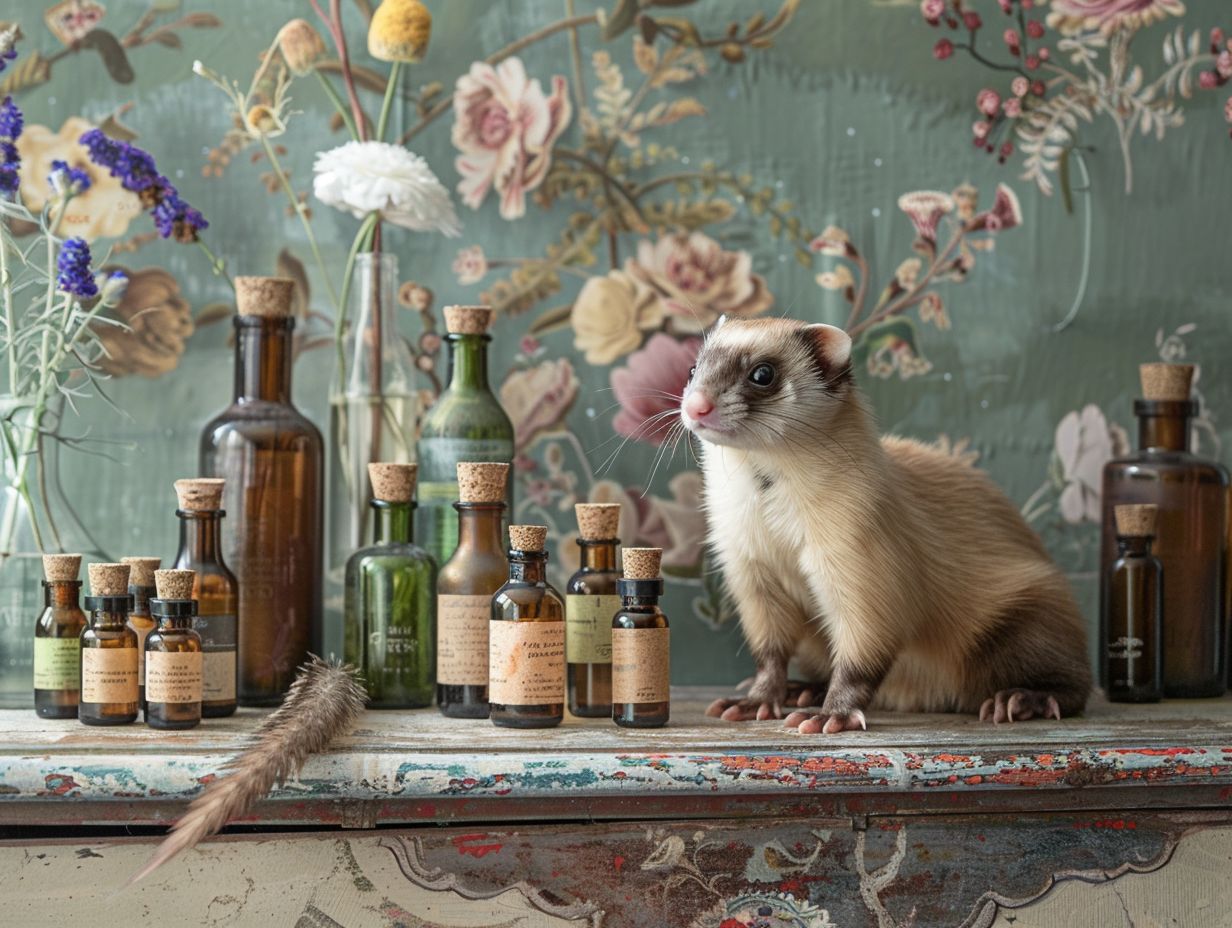Can Ferrets Be Around Essential Oils
If you’re a ferret owner who loves essential oils, it’s important to know whether it’s safe to use them around your furry friends.
In this article, we’ll explore the risks of using essential oils around ferrets and which oils are toxic to them. We’ll also discuss alternative options and provide tips on how to safely use essential oils around your ferrets.
Additionally, we’ll cover what to do if your ferret has been exposed to essential oils. Keep reading to ensure the well-being of your beloved pets!
Key Takeaways:
Can Ferrets Be Around Essential Oils?
In terms of ferrets and essential oils, it’s crucial to understand the potential risks and dangers involved to ensure the well-being of your furry companions.
Essential oils have gained popularity for their aromatic qualities and various health benefits in humans, but when it comes to pets, particularly ferrets, one must exercise caution. Ferrets have a heightened sensitivity to certain substances, including essential oils, which can pose harmful effects on their respiratory and nervous systems.
Exposure to essential oils can lead to symptoms such as difficulty breathing, skin irritation, nausea, and even neurological issues in ferrets. It’s vital to keep essential oils out of reach of pets and avoid using diffusers or topical applications near them to prevent accidental ingestion or inhalation of these potentially toxic substances.
What Are Essential Oils?
Essential oils are natural aromatic compounds extracted from plants, capturing the plant’s scent and flavor essence.
These oils have been used for centuries in various cultures for their therapeutic properties and are popular in practices like aromatherapy. The extraction process involves methods such as steam distillation, cold pressing, or solvent extraction, depending on the plant material.
- Lavender
- Chamomile
Lavender and chamomile oils are among the most well-known essential oils, prized for their calming and soothing effects. They can be used in diffusers, massages, bath soaks, or even diluted and applied directly to the skin.
What Are The Risks Of Using Essential Oils Around Ferrets?
Using essential oils around ferrets can pose significant risks as these oils contain compounds that can be toxic to your pets, potentially leading to severe symptoms and even liver failure.
Common symptoms of toxicity in ferrets exposed to essential oils include lethargy, difficulty breathing, drooling, vomiting, and tremors. When left untreated, these symptoms can progress to organ failure, seizures, and even death. It is crucial to remember that ferrets have a highly sensitive respiratory system, and inhaling the vapors from certain essential oils can cause respiratory distress. If you suspect your ferret has been exposed to essential oils, it is essential to seek immediate veterinary help. A veterinarian can provide appropriate treatment to mitigate the dangers of essential oil toxicity in your furry companion.
What Essential Oils Are Toxic To Ferrets?
Several essential oils can be highly toxic to ferrets, posing a severe threat to their health and well-being if exposed.
Tea tree oil, with its strong anti-microbial properties, can actually be harmful to ferrets if ingested, inhaled, or even applied on their skin.
Eucalyptus oil is another potential danger as it can cause respiratory distress and central nervous system depression in these small animals.
Peppermint oil is known for its cooling sensation in humans, but for ferrets, it can lead to gastrointestinal upset, liver damage, and even central nervous system issues.
Citrus oils, such as lemon and orange, contain high levels of limonene and other compounds that are toxic to ferrets, leading to various health complications if exposed.
Tea Tree Oil
Tea Tree Oil is known to be particularly harmful to ferrets due to its high concentration of phenols, which can lead to severe toxicity and health issues in these pets.
The danger lies in the fact that ferrets are extremely sensitive to certain compounds found in Tea Tree Oil, especially the phenols.
When exposed to this oil, ferrets can experience a range of symptoms, including drooling, vomiting, weakness, tremors, and even potentially life-threatening complications.
Ingestion or skin contact with Tea Tree Oil can result in central nervous system depression and other serious health issues for these small animals.
It is crucial to keep Tea Tree Oil away from ferrets to prevent any accidental exposure.
Eucalyptus Oil

When exposed to Eucalyptus Oil, ferrets may experience respiratory issues, skin irritation, or even digestive problems due to their sensitive nature. The strong scent and compounds present in the oil can overwhelm their respiratory system, leading to difficulty breathing.
Direct contact with the oil can cause skin irritation and allergies in ferrets. As grooming animals, they may unintentionally ingest the oil while cleaning themselves, which can result in digestive distress and toxicity.
It is crucial to keep all essential oils, especially Eucalyptus Oil, out of reach from ferrets and ensure a safe environment for these delicate pets.
Peppermint Oil
Peppermint Oil can be toxic to ferrets, potentially leading to severe health issues, including liver failure, if ingested or exposed to inappropriately.
When ferrets come into contact with Peppermint Oil, it can cause respiratory issues, skin irritation, and gastrointestinal problems. The liver failure risk is particularly concerning, as ferrets have a sensitive digestive system. It’s essential to keep any products containing Peppermint Oil well out of reach of your ferret, as even small amounts can be harmful. If you suspect your ferret has come into contact with Peppermint Oil, it’s crucial to seek immediate veterinary attention. A veterinarian can provide the necessary treatment to help mitigate the potential risks and ensure your ferret’s safety.
Citrus Oils
Citrus Oils, commonly found in many households, can be toxic to ferrets, causing harm and adverse reactions if these oils come into contact with the pets.
Due to their high levels of limonene and linalool, which can be irritants to ferrets, using citrus oils in room sprays or diffusers can pose a significant risk to your furry companions. Even a small amount of exposure to these oils can lead to symptoms such as vomiting, diarrhea, drooling, and in severe cases, liver damage or respiratory distress. It’s crucial to keep all products containing citrus oils out of reach of your ferrets to prevent accidental ingestion or inhalation.
What Are The Alternatives To Essential Oils For Ferrets?
Fortunately, there are safe alternatives to essential oils that can be used around ferrets to provide a pleasant scent without posing any harm to these pets.
One such alternative is vanilla, which emits a subtle and soothing aroma that is gentle on ferrets’ sensitive respiratory systems. You can place a few drops of vanilla extract on a cotton ball and discreetly position it in their living area to enjoy the fragrance without overwhelming their senses.
Another natural option is coconut oil, which not only has a pleasant scent but also offers nourishing benefits for ferrets’ skin and fur. Simply melt a small amount of coconut oil and rub it lightly on your hands before petting your furry friend to transfer the fragrance.
Ferret-Safe Fragrances
Choosing ferret-safe fragrances can ensure a pleasant environment for your pets without the risks associated with toxic essential oils.
In terms of creating a soothing atmosphere for your furry friends, it’s essential to opt for scents that are not only safe but also enjoyable for them.
Lavender and chamomile are popular choices that are known for their calming effects on ferrets. These gentle fragrances can help alleviate stress and anxiety in your pets, making their living space a sanctuary of relaxation.
Steer clear of strong, overpowering scents like citrus or pine, as these may overwhelm their sensitive noses and respiratory systems. Always remember that a little goes a long way when using a scent diffuser around your ferrets.
Natural Herbs And Plants
Natural herbs and plants can be excellent alternatives to essential oils for creating a soothing and safe environment for ferrets.
One such herb that is beneficial for ferrets is jasmine. Not only does it have a pleasant aroma, but it also possesses calming properties that can help reduce stress in your furry friends. You can introduce jasmine plants in the ferret’s living space or use jasmine essential oils in a diffuser to promote relaxation.
Incorporating spices like cinnamon and turmeric can also benefit ferrets. These spices have antioxidant properties that can boost the immune system and aid in digestion. It’s crucial to consult with a veterinarian before introducing any new herbs or spices to your ferret’s diet to ensure their safety and well-being.
How To Safely Use Essential Oils Around Ferrets?

When using essential oils around your ferrets, it is crucial to dilute the oils properly before application. Direct contact with undiluted oils can be too potent and cause adverse effects on your pets. Additionally, proper storage of essential oils is paramount to ensure the safety of your pets. Keep all oils securely locked away in cabinets or shelves that are inaccessible to your curious critters.
Another important aspect is closely monitoring your ferret’s reaction when introducing them to new scents. Watch for any signs of discomfort, irritation, or unusual behavior after exposure to the oils.
Dilute The Oils
Diluting essential oils before use can reduce their potency and minimize the risks of adverse effects on ferrets, ensuring a safer environment for your pets.
When using essential oils around your ferret, it’s crucial to remember that their small bodies can’t process strong concentrations in the same way humans can. Diluting the oils helps in preventing skin irritations, respiratory issues, or even toxic reactions in your furry friends. The general rule of thumb is to dilute essential oils at a ratio of 1-2% for ferrets, using a carrier oil like coconut or olive oil. This dilution method ensures that the oils are properly dispersed and gentle enough for your pet.
- For room diffusion, add a few drops to a diffuser with water for a mild scent that won’t overwhelm your ferret’s senses.
- When using a diffuser, make sure the room is well-ventilated, and always monitor your pet’s reaction to the aroma.
Keep The Oils Out Of Reach
To prevent accidental exposure, it’s crucial to store essential oils securely out of reach of pets, minimizing the risk of ingestion or contact.
Proper storage not only ensures the safety of your furry friends but also safeguards your household from potential mishaps. Keep essential oils in a cool, dark place away from direct sunlight and heat sources to maintain their potency and prevent degradation. Always tightly seal the bottles to avoid spills or leaks that could lead to unintended exposure. Consider investing in lockable cabinets or high shelves to add an extra layer of protection against curious paws or noses. Remember, a little caution upfront can prevent a whole lot of trouble later on.
Observe Your Ferret’s Reaction
Monitoring your ferret’s reaction to essential oils is crucial in identifying any adverse effects promptly and seeking veterinary assistance if needed.
Due to their sensitive respiratory systems, ferrets may exhibit symptoms such as sneezing, coughing, or difficulty breathing when exposed to certain essential oils, which can be harmful if not addressed promptly.
Some essential oils contain compounds that can be toxic to ferrets and lead to liver failure if ingested or absorbed through the skin.
Therefore, it is imperative to observe your ferret’s behavior closely after using essential oils and consult a veterinarian immediately if you notice any unusual symptoms or changes in their usual demeanor.
What To Do If Your Ferret Has Been Exposed To Essential Oils?
If your ferret has been exposed to essential oils, it’s essential to act promptly to minimize any potential harm and ensure your pet’s well-being.
The first step after exposure is to carefully observe your ferret for any signs of distress or unusual behavior. Symptoms of essential oil exposure in ferrets can include drooling, difficulty breathing, lethargy, or vomiting.
Monitoring is crucial in determining the severity of the situation. If you notice any concerning symptoms, immediate veterinary attention is necessary.
Contact your veterinarian to inform them of the exposure and follow their guidance for further action. It’s important to provide a safe environment for your ferret by removing any remaining essential oils from the area and ensuring good ventilation.
Comfort and care are key during this time, so offer your pet a quiet and stress-free space to recover.
Monitor Your Ferret’s Symptoms
Keeping a close eye on your ferret’s symptoms post-exposure to essential oils can help in identifying any potential health issues early on and taking appropriate action.
It is crucial to be vigilant and observe for any unusual behaviors or physical changes in your furry friend.
Some common signs of toxicity in ferrets exposed to essential oils include respiratory distress, gastrointestinal upset, lethargy, and skin irritation. If you notice any of these symptoms, it is important to seek immediate veterinary intervention to prevent any serious complications.
Remember, while aromatherapy and oils can have benefits, they can also pose risks if not used carefully around your small companion.
Contact Your Veterinarian

In case of ferret exposure to essential oils, contacting your veterinarian is crucial to seek professional guidance and medical assistance to ensure your pet’s health and safety.
Essential oils can be toxic to pets, including ferrets, due to their concentrated nature. A veterinarian will assess the severity of the exposure and recommend appropriate treatment options, which may include supportive care, monitoring, and potential medical interventions. It is important to avoid home remedies or self-treatment as the use of certain products can worsen the situation. Additionally, ferrets have a unique physiology that requires specialized care, making professional intervention essential for their well-being in case of toxic exposure.
Provide Fresh Air And Water
Offering fresh air and water to your ferret post-exposure to essential oils can help in alleviating any respiratory discomfort and ensuring hydration during the recovery process.
Essential oils, commonly derived from various plants, may have soothing effects for humans but can pose risks to ferrets due to their sensitive respiratory systems. It’s crucial to provide them with a well-ventilated environment to minimize any lingering effects.
- Safe
- and effective plants can aid in their recuperation, promoting a healthy internal balance.
Additionally, water intake is vital to flush out any toxins and maintain their overall well-being. By prioritizing fresh air and water, you can support your ferret’s recovery and ensure their comfort.
Frequently Asked Questions
Can ferrets safely be around essential oils?
Yes, ferrets can be around certain essential oils, but it is important to use them safely and with caution. Some oils can be harmful to ferrets, so it is important to do your research before exposing your ferret to any essential oils.
What essential oils are safe for ferrets?
Some safe essential oils for ferrets include lavender, chamomile, and ginger. It is best to dilute these oils with water before using them around your ferret, and always monitor your ferret’s reaction to ensure they are not having any negative reactions.
What essential oils should I avoid using around my ferret?
Essential oils that are toxic to ferrets include citrus oils, cinnamon, tea tree, and eucalyptus. These oils can cause skin irritation, respiratory problems, and other health issues in ferrets. It is also important to keep these oils out of reach of your ferret to prevent accidental ingestion.
Can I use essential oils on my ferret?
Some essential oils can be used on ferrets for specific purposes, such as soothing skin irritations or promoting relaxation. However, it is important to consult with a veterinarian before using any essential oils on your ferret to ensure it is safe and appropriate for their specific needs.
What should I do if my ferret has had contact with a toxic essential oil?
If your ferret has had contact with a toxic essential oil, it is important to seek veterinary care immediately. Symptoms of essential oil toxicity in ferrets can include drooling, vomiting, difficulty breathing, and weakness. Do not wait for symptoms to appear, as quick action can save your ferret’s life.
How can I safely use essential oils around my ferret?
To safely use essential oils around your ferret, always dilute the oil with water and monitor your ferret’s reaction closely. Avoid using oils that are known to be toxic to ferrets, and keep all oils out of reach of your ferret. It is also important to properly store and dispose of essential oils to prevent accidental ingestion.







